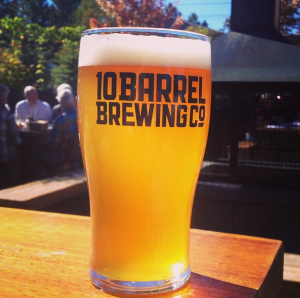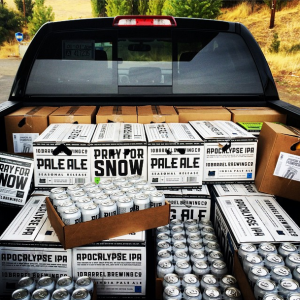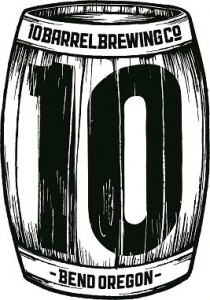
Projected to brew over 40,000 barrels in 2014, 10 Barrel currently distributes its products in Oregon, Washington, Idaho and Vermont. The company also operates a brewery and pub in Bend as well a satellite brewpub in Boise, Idaho with plans to open a third brewpub location in Portland, Ore.
Financial details were not disclosed, however 10 Barrel and A-B InBev executives discussed the acquisition, as well as A-B’s growing interest in the craft category, during a phone call with Brewbound on Wednesday.
10 Barrel co-founder Jeremy Cox said the decision to sell was driven largely by his company’s rapid growth and the need for a more mature infrastructure.
“We had some challenges growing the business,” he said “About three months ago, we realized we needed to find a strategic partner to help us with that.”
Those challenges — hiring, sourcing raw ingredients and managing rapid growth — led 10 Barrel’s three founding partners to explore an exit strategy.
Indeed, 10 Barrel’s growth was rapid, even by today’s industry standards. In 2013, the company grew its production nearly 300 percent, to 23,500 barrels. And, with 2014 volumes quickly approaching the 45,000-barrel mark, the company decided it needed the help of a strategic partner who could provide capital as well as industry expertise.
“It was strategic all the way,” said Garrett Wales, who launched the business with Jeremy Cox and his brother, Chris Cox in 2006.
Enter A-B, a global brewer with an affinity for acquisition and a war chest of cash reserves on hand to buy small brands. Fresh off its purchase of New York’s Blue Point Brewing in February, many in the craft space believed A-B was actively looking for an opportunity to add to its recently established high-end division, which is dedicated to selling craft brands.
“We loved their beer and the portfolio of brands they had built,” Andy Goeler, A-B InBev’s CEO of craft operations, told Brewbound.
For now, those brands and the employees who helped to build them will remain intact. The short-term plan, Wales said, is to continue growing and focusing on its pre-existing markets before it looks to expand distribution outward.
“We are going to continue pushing the envelope with our beers, support our local markets and take care of the home turf,” he said.
Goeler described the decision to acquire 10 Barrel as “very easy” characterizing the company as one that will “fit perfectly” with its other acquired brands — Chicago’s Goose Island, which it purchased in 2011 for $38.8 million, and Blue Point Brewing, which it bought in February for an undisclosed amount. Sources familiar with the Blue Point transaction valued that deal between $18 a $24 million.

When pressed again, Goeler admitted that the acquisition would give A-B — which faces stiff competition from a raft of smaller players in the Pacific Northwest — better access to one of the most craft-savvy regions in the entire country.
“This gives us a great footprint in the Pacific Northwest,” Goeler said. “You get into some of these other markets and notice that the local and regional brands have strength. It is better to do something like this than to build a brand from the outside.”
A-B InBev already produces and markets its own Shock Top line of craft-style beers, a brand that was developed, in-house, to compete in the craft space. Through Oct. 5, year-to-date sales of Shock Top Belgian White were up 8.6 percent in multi-outlet and convenience stores, according IRI, a Chicago-based market research firm.
But it is increasingly apparent that A-B InBev is focusing on acquisitions as a means to stimulate long-term development in the thriving craft segment, and in areas of the country where craft share has grown considerably.
The strategy appears to be working and A-B InBev’s acquisition of Goose Island has proved to be a steady source of growth for that brand, enabling the company to increase production of core brands while simultaneously growing its barrel-aging program. While its too early to tell how its ownership may be impacting the Blue Point business, Goose Island has flourished. Distribution has expanded into all 50 states, a national ad campaign has been developed and, although exact volumes are not known, production has definitely increased. Through October 5, year-to-date sales of flagship offering 312 Urban Wheat in MULC were up 13.8 percent. Sales of Goose Island IPA were up 33 percent.

Goeler wouldn’t comment on specific acquisition targets or regions of the country where A-B InBev is focusing its search, but said that the company would continue “looking for opportunities.”
While some industry professionals were caught off guard by Wednesday’s sudden announcement, Brewbound learned from at least one trusted industry source who is familiar with the craft beer landscape in the Pacific Northwest that A-B InBev was looking to purchase a brewery in the region.
And the company had already gotten its feet wet on the distribution side. Earlier this year, Portland-based Morgan Distributing was acquired by A-B InBev. And in 2011, A-B InBev repurchased Western Distributing, a wholesaler it had owned 56 percent of and previously sold to Major Brands Inc. in 2008.
Meanwhile, in mature craft markets, Bud has started to struggle. In the 52-week period ending June 29, craft’s dollar share in Portland, Ore. grocery accounts, a key market and channel for craft, eclipsed 41 percent, according to IRI. While that figure includes brands like Shock Top, Blue Moon, Leinenkugel and Widmer, the message is clear — craft, and craft-like products, are cutting into A-B’s core domestic lager business. In fact, during that period, A-B lost 3.6 percent of total beer dollar sales.
In that context, yesterday’s acquisition was not only unsurprising, it seemed almost necessary, if the world’s largest brewer intends to continue competing in an increasingly important and competitive craft beer segment.
